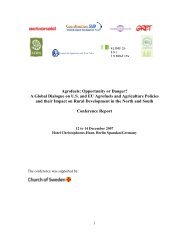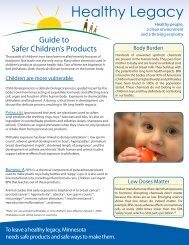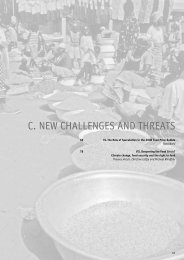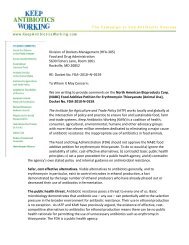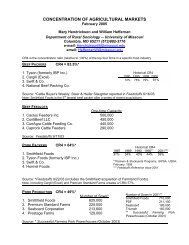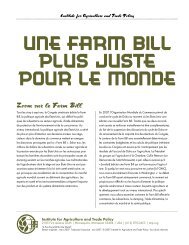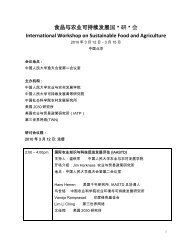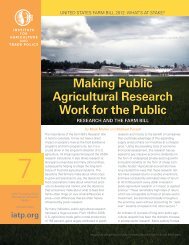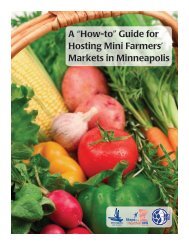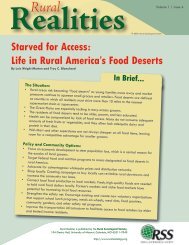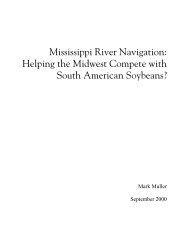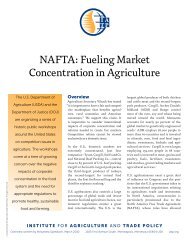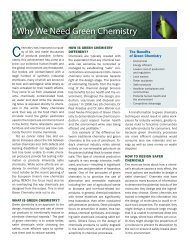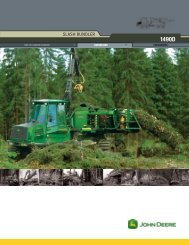IATP Hog Report - Institute for Agriculture and Trade Policy
IATP Hog Report - Institute for Agriculture and Trade Policy
IATP Hog Report - Institute for Agriculture and Trade Policy
You also want an ePaper? Increase the reach of your titles
YUMPU automatically turns print PDFs into web optimized ePapers that Google loves.
Section 0<br />
hog factories avoid the expenses associated with socially responsible<br />
practices, such protections give hog factories leeway to grow <strong>and</strong> squeeze<br />
independent family hog farmers out of the market.<br />
VI. Pigs in the Poky<br />
http://www.iatp.org/hogreport/sec0.html (8 of 11)2/27/2006 3:50:00 AM<br />
Part Six: Pigs in the Poky describes the impacts of factory farming on<br />
farm animals <strong>and</strong> their implications <strong>for</strong> human welfare.<br />
Farmers who treat their animals with respect <strong>for</strong> their natures are<br />
internalizing the costs of providing a decent life <strong>and</strong> humane environment<br />
<strong>for</strong> them. Animal factories externalize those costs by evading that<br />
responsibility. The first to bear these externalized costs are the animals but<br />
the costs of the failure to farm in ways that respect the welfare of farm<br />
animals extend beyond the boundary of the farm. Everyone ultimately<br />
bears the costs of the reduced effectiveness of antibiotics. Taxpayers <strong>and</strong><br />
natural resource users bear the costs of soil <strong>and</strong> water pollution by liquid<br />
manure spills. Future generations will bear the costs of global warming<br />
<strong>and</strong> depleted resources. Until production systems meet the species-specific<br />
needs of farm animals, we are farming beyond their ability to adapt.<br />
Ultimately, ignoring the welfare of production animals makes animal<br />
agriculture unsustainable.<br />
Industrial rearing of farm animals has resulted in loss of individual<br />
animals' fitness <strong>and</strong> in loss of genetic diversity. It has increased the<br />
incidence of environmentally-induced animal illnesses, diseases, <strong>and</strong><br />
injuries as well as the frequency of abnormal behaviors indicative of<br />
severe mental distress. Factory farming is pushing animals beyond their<br />
ability to adapt. Consequently, many die prematurely from the stress. For<br />
example, Time Magazine reported in November 1998 that the 1997 hog<br />
death toll at Seaboard Farms in Oklahoma was 48 hog deaths an hour, or<br />
420,000 <strong>for</strong> the year. Industry spokespeople estimate that as many as 20%<br />
of breeding sows die prematurely from exhaustion <strong>and</strong> stress due to<br />
impacts of restrictive confinement <strong>and</strong> accelerated breeding schedules.<br />
Industrial hog rearing methods are especially hard on pigs in the breeding<br />
herd who are confined to crates so narrow <strong>and</strong> short that they cannot walk<br />
or turn around. The inactivity leads to muscle atrophy <strong>and</strong> osteoporosis.<br />
Sows, adult females, may collapse <strong>and</strong> not be able to st<strong>and</strong> up again when<br />
they are made to walk. They may be beaten <strong>and</strong> dragged be<strong>for</strong>e they are<br />
killed <strong>and</strong> placed on the "dead pile" to be picked up by rendering trucks.<br />
The mass production of farm animals in industrial systems has resulted in<br />
a changed "disease panorama" across animal agriculture. New animal<br />
diseases have emerged <strong>and</strong> they are harder <strong>and</strong> harder to treat. Animal<br />
diseases also have consequences <strong>for</strong> the safety of food consumed by



